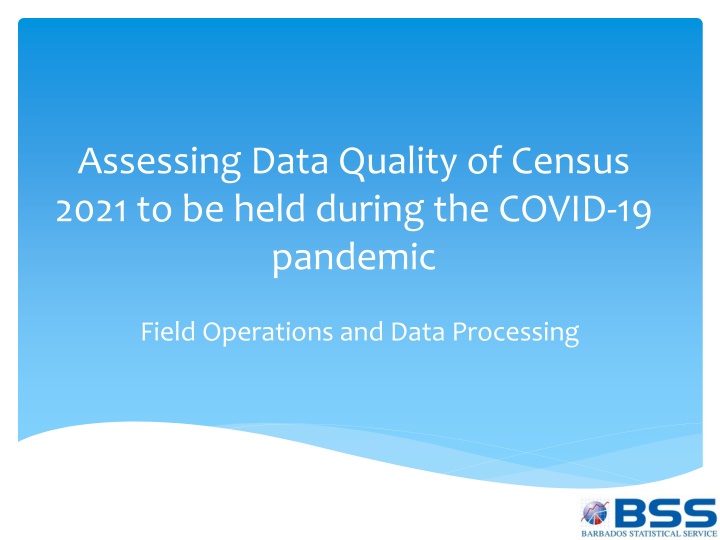
Assessing Data Quality of Census 2021 During COVID-19 Field Operations and Processing
Explore how the Census 2021 adapted to the challenges of the COVID-19 pandemic, implementing self-enumeration, field enumeration, data processing strategies, and addressing the needs of challenging population groups.
Download Presentation

Please find below an Image/Link to download the presentation.
The content on the website is provided AS IS for your information and personal use only. It may not be sold, licensed, or shared on other websites without obtaining consent from the author. If you encounter any issues during the download, it is possible that the publisher has removed the file from their server.
You are allowed to download the files provided on this website for personal or commercial use, subject to the condition that they are used lawfully. All files are the property of their respective owners.
The content on the website is provided AS IS for your information and personal use only. It may not be sold, licensed, or shared on other websites without obtaining consent from the author.
E N D
Presentation Transcript
Assessing Data Quality of Census 2021 to be held during the COVID-19 pandemic Field Operations and Data Processing
Content Background Impetus for Change Assessing quality: Field Enumeration Assessing quality: Data Processing Challenging Population Groups Post Enumeration Survey
Background Initially, the Population and Housing Census was set for May 1st, 2020. Preparations began in 2017 for a traditional Census using CAPI. There were challenges, namely budgetary and the advent of COVID-19 during Quarter 1, 2020 which led to the postponement of Census to August 1st, 2020.
Impetus for Change The contagious nature of COVID-19 coupled with financial constraints led the Department to change the methodology proposed-CAWI in the first instance, followed by CATI and CAPI (mixed mode approach). There was also a need to work closer with other Government and academic institutions on inter- related projects, in order to reduce national budget.
Assessment of quality: Field Enumeration Self-enumeration using CAWI will be employed in the first instance. During this phase, built in edit checks will be used to avoid/reduce inconsistencies, then followed up by using CATI by enumerators. During the CAPI phase, data will be checked by supervisors before being uploaded. Software will be used to monitor response rates as questionnaires are received.
Assessment of quality: Data Processing Imputation will be used to some extent, during processing to correct errors and non- response Cross checks will be made with administrative sources, (e.g.) education and vital registration to validate the quality of data received, along with the National Identification card registration, which will be a valid check of the population coverage, as it is intended to cover the entire resident population.
Challenging Population Groups Homeless Gated communities Persons who live off the beaten track Disabled community Persons who do not have internet Persons unable to use the internet for various reasons.
Assessment of quality: Challenging Population groups Data from the homeless, gated communities, persons who live in isolated areas and the disabled communities can be verified through administrative data. The BSS is actively trying to find appropriate solutions to gain data from persons who do not have access to the internet and persons who are unable to use the internet .
Assessment of quality: Challenging Population groups-cont d When data is collected from the groups identified previously, the task will be to find ways to assess the quality of said data.
Post Enumeration Survey Traditionally, the BSS does not conduct a post enumeration survey. Alternatively, we will use administrative data to assess the success of the Census Activity.
Questions and Comments Janelle Scantlebury-Mounsey Census Coordinator Census Office jscantleburymounsey@barstats.gov.bb 1-246-535-2677 Natalia Parris Statistician I Social and Demographic Statistics Division nparris@barstats.gov.bb 1-246-535-2682 Nadia E. M Skeete Statistician I Social and Demographic Statistics Division nskeete@barstats.gov.bb 1-246-535-2650
